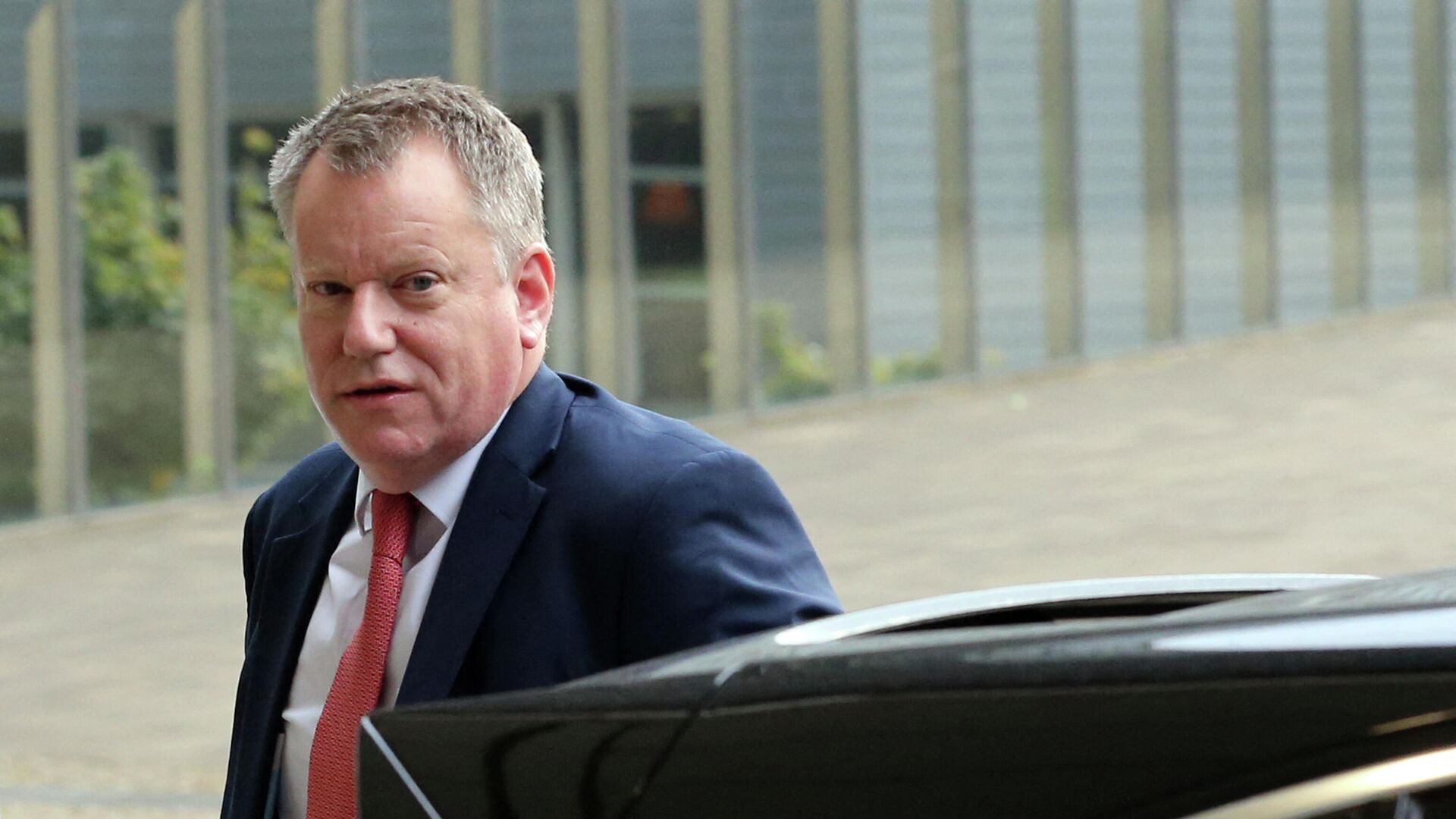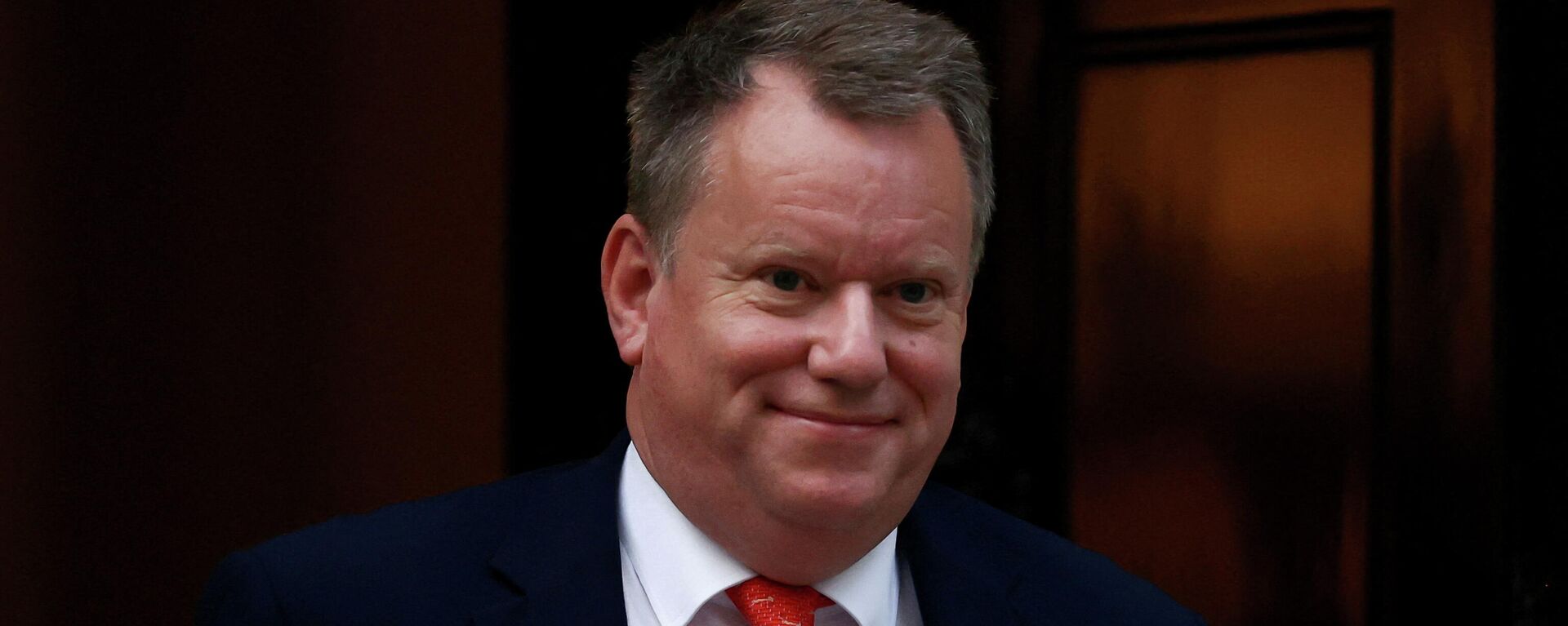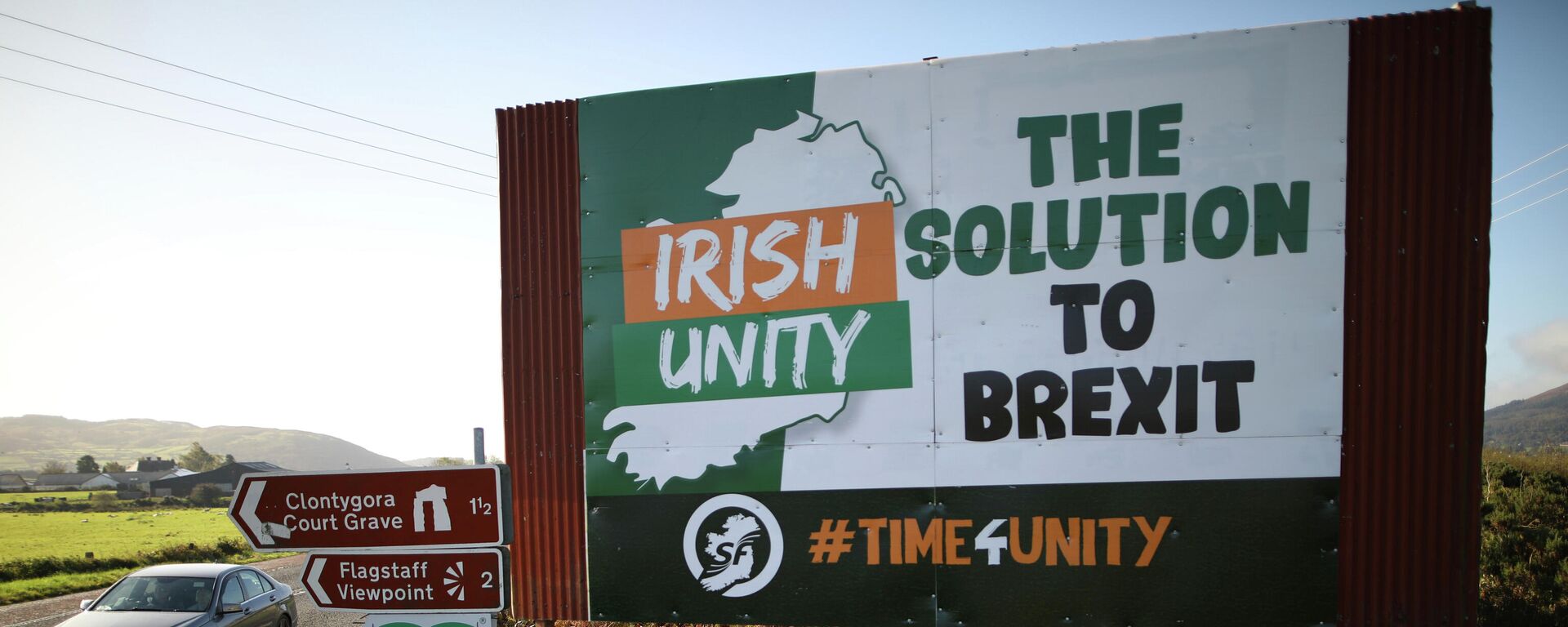EU to Maintain Advantage Over UK in Post-Brexit Talks No Matter Who Replaces Frost, Expert Says
15:08 GMT 19.12.2021 (Updated: 15:35 GMT 28.05.2023)

© FRANCOIS WALSCHAERTS
Subscribe
Brexit minister David Frost has resigned from the UK government over his "disillusionment" with the direction of London's policy.
Dr Theofanis Exadaktylos, reader in European Politics at the University of Surrey, reflects on who could be the UK's next chief post-Brexit negotiator with the EU and what could be the outcome of difficult UK-EU negotiations regarding the Northern Ireland Protocol.
Sputnik: Now that the UK's chief Brexit negotiator David Frost has resigned, who will replace him?
Dr Theofanis Exadaktylos: There are rumours of a number of Tory backbenchers, as we call them, that are there to potentially replace Lord Frost. However, there is not a single name that's been floated around. The problem that we have with Lord Frost is that he was one of the protagonists of the Brexit negotiations process. He was someone who was highly knowledgeable about how Europe operates and what kind of things they have discussed in the negotiations process and so on. So, the gap that he leaves in terms of knowledge is quite big. In terms of the administration side - no, it's not such a big gap. In any case, this type of ministry was quite junior in terms of the hierarchical structures of the government. So Brexit has been demoted as an issue all in all, so we could see someone more junior taking up that post. But definitely, that person will have to, first of all, agree with the government's position on Brexit and follow up the negotiations, and also be a supporter of government policy overall. That's the one thing that Boris Johnson, I think, needs to avoid - having someone who is a direct opponent, of course, on these matters.
There is no kind of intelligence on who will be replacing. But the idea is that there are a number of MPs, Members of Parliament, who could replace him. But I think there is a movement by those who rebelled against the coronavirus measures last week to push for one of their own to be there. I don't think Boris Johnson will actually accept this kind of person.
Dr Theofanis Exadaktylos: There are rumours of a number of Tory backbenchers, as we call them, that are there to potentially replace Lord Frost. However, there is not a single name that's been floated around. The problem that we have with Lord Frost is that he was one of the protagonists of the Brexit negotiations process. He was someone who was highly knowledgeable about how Europe operates and what kind of things they have discussed in the negotiations process and so on. So, the gap that he leaves in terms of knowledge is quite big. In terms of the administration side - no, it's not such a big gap. In any case, this type of ministry was quite junior in terms of the hierarchical structures of the government. So Brexit has been demoted as an issue all in all, so we could see someone more junior taking up that post. But definitely, that person will have to, first of all, agree with the government's position on Brexit and follow up the negotiations, and also be a supporter of government policy overall. That's the one thing that Boris Johnson, I think, needs to avoid - having someone who is a direct opponent, of course, on these matters.
There is no kind of intelligence on who will be replacing. But the idea is that there are a number of MPs, Members of Parliament, who could replace him. But I think there is a movement by those who rebelled against the coronavirus measures last week to push for one of their own to be there. I don't think Boris Johnson will actually accept this kind of person.
Sputnik: Frost has been described as a "combative" figure in regards to the post-Brexit talks with the EU multiple times. How will his resignation influence the future of the negotiations over the Northern Ireland Protocol?
Dr Theofanis Exadaktylos: That is a very interesting question, primarily because Lord Frost was quite a hardcore Brexit supporter and therefore negotiator. All the talks were going on the edge of things, there was a fine balance to be walked. If he's replaced with someone who is equally hard on the positions around the future relationship with the EU and they are similar, then obviously we're going to see a continuation of this edgy process, of this fine balance being walked through, also because the UK lately has taken a couple of steps back, especially when it comes to the oversight of the European Court of Justice on Northern Ireland, for example. Maybe the person who comes in will be a little bit milder and actually they will try to iron out the problems that exist as a result of the current agreement. I think we can go with these two scenarios, and if someone replaces Lord Frost with the same ideas in mind, then we will continue on this conflictual pathway. But if someone who is a little bit more moderate comes in as a result of this replacement, and my view would be that it is in the interest of Boris Johnson to have someone with milder points of view and to settle a few things, then the change would be a little bit more positive.
Sputnik: Will his resignation strengthen the EU’s hand in ongoing talks?
Dr Theofanis Exadaktylos: Most likely. In any case, in my personal view, the EU never lost the upper hand. I think the UK has never had an upper hand. I think the EU will be able to maintain a much more advantageous position, not the upper hand, but an advantageous position vis-a-vis the UK, no matter who replaces Lord Frost.
Dr Theofanis Exadaktylos: That is a very interesting question, primarily because Lord Frost was quite a hardcore Brexit supporter and therefore negotiator. All the talks were going on the edge of things, there was a fine balance to be walked. If he's replaced with someone who is equally hard on the positions around the future relationship with the EU and they are similar, then obviously we're going to see a continuation of this edgy process, of this fine balance being walked through, also because the UK lately has taken a couple of steps back, especially when it comes to the oversight of the European Court of Justice on Northern Ireland, for example. Maybe the person who comes in will be a little bit milder and actually they will try to iron out the problems that exist as a result of the current agreement. I think we can go with these two scenarios, and if someone replaces Lord Frost with the same ideas in mind, then we will continue on this conflictual pathway. But if someone who is a little bit more moderate comes in as a result of this replacement, and my view would be that it is in the interest of Boris Johnson to have someone with milder points of view and to settle a few things, then the change would be a little bit more positive.
Sputnik: Will his resignation strengthen the EU’s hand in ongoing talks?
Dr Theofanis Exadaktylos: Most likely. In any case, in my personal view, the EU never lost the upper hand. I think the UK has never had an upper hand. I think the EU will be able to maintain a much more advantageous position, not the upper hand, but an advantageous position vis-a-vis the UK, no matter who replaces Lord Frost.
Sputnik: What changes in the UK approach to the Northern Ireland Protocol should be expected?
Dr Theofanis Exadaktylos: We already see some movement, especially with the acceptance of the ECJ as someone who can oversee the application of the protocol, not necessarily intervene, but at least oversee. I think we're going to see a little bit of a positive, more cooperative change when it comes to Northern Ireland. I think it is in the best interest of both sides to find a solution forward, and I think this is a good opportunity now.
I don't think many details will change, to be honest, but I think the attitude will change. So we will probably see a little bit of a more cooperative attitude to solve issues, to iron out certain differences, to figure out ways forward rather than sticking to a very hardcore position, whether further forward or backward. I think that's the most important thing. The details will emerge effectively. It is the attitude, the approach to this issue that will need to change.
Dr Theofanis Exadaktylos: We already see some movement, especially with the acceptance of the ECJ as someone who can oversee the application of the protocol, not necessarily intervene, but at least oversee. I think we're going to see a little bit of a positive, more cooperative change when it comes to Northern Ireland. I think it is in the best interest of both sides to find a solution forward, and I think this is a good opportunity now.
I don't think many details will change, to be honest, but I think the attitude will change. So we will probably see a little bit of a more cooperative attitude to solve issues, to iron out certain differences, to figure out ways forward rather than sticking to a very hardcore position, whether further forward or backward. I think that's the most important thing. The details will emerge effectively. It is the attitude, the approach to this issue that will need to change.


